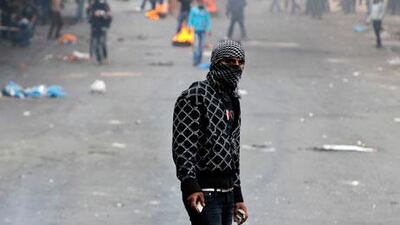SAEER, WEST BANK // Mahmoud Abbas, the Palestinian president, today accused Israel of deliberately fanning Palestinian unrest during a week of clashes with Israeli forces and the suspicious death of a Palestinian man in an Israeli prison.
The declaration came amid warnings by both Israelis and Palestinians of a third intifada, or Palestinian uprising, over escalating confrontations with Jewish settlers and Israel's security forces in the West Bank and east Jerusalem.
"The Israelis want chaos and we know it but we won't let them," Mr Abbas said from his presidential compound in Ramallah, the Palestinian Authority (PA) administrative capital.
Apparently responding to a demand a day earlier by Israel's premier, Benjamin Netanyahu, that he restrain Palestinian demonstrations, Mr Abbas insisted that his people wanted peace and freedom, saying "no matter how hard they try to drag us into their schemes, we will not be dragged".
Palestinian anger flared today following accusations by PA officials that Israeli security and prison officials tortured to death a Palestinian man, 30-year-old Arafat Jaradat, on Saturday.
Thousands of mourners marched during his funeral procession in his West Bank village of Saeer, many with demands for revenge. "We sacrifice our souls and our blood for you, our martyr!" chanted groups of young men while dozens of armed PA security forces closely monitored the situation.
Citing parts of autopsy on Sunday describing Jaradat's badly beaten body - including two broken ribs, bruises and lacerations - PA officials dismissed Israel's initial claim of death by an apparent heart attack.
"There were marks of torture on the back, marks of torture on the chest, a deep wound on the upper side of the shoulder, wounds alongside the spine and marks of torture underneath the skin," Issa Qaraqe, the PA detainees affairs minister, said of the autopsy's findings, which was carried out in Israel by Israeli and Palestinian physicians.
Israel's health ministry has said the results from the autopsy show the causes of death were inconclusive and speculated that Jaradat's injuries may have been sustained during attempts by authorities to resuscitate him. It said further examination was needed of microscopic and toxicology reports.
Some Israeli officials have been warning of the need to halt the escalation with Palestinians, which included a hunger strike by more than 3,000 Palestinian prisoners in Israeli jails on Sunday in solidarity with Jaradat.
Deadly clashes between Palestinians and Israeli soldiers and settlers could trigger a mass uprising, Avi Dichter, Israel's homeland security minister, warned today. Erupting in 2000 and lasting for more than half a decade, the last intifada killed thousands of Palestinians and Israelis.
"Fatalities are almost a proven recipe for a sharper escalation," Mr Dichter told Israel Radio.
Israel may now be trying to bolster the PA against an acute financial crisis that has prevented it from paying some 150,000 employees regularly. On Sunday, Mr Netanyahu agreed to transfer some US$100 million (Dh367m) in tax revenue collected on behalf of the Palestinians.
Israel began refusing to hand over the tax money last year in apparent retaliation for Palestinian recognition in the United Nations as a non-member observer state.
But Israel's financial gesture did little to appease residents in Saeer, where masked, armed men standing on rooftops observed Jaradat's coffin pass through village roads until it reached the cemetery. Young men waived flags of various Palestinian factions, including the green one of the Gaza Strip's Hamas rulers.
A flyer distributed to mourners by the Al Aqsa Martyrs Brigades, the armed wing of Mr Abbas's Fatah faction, called Jaradat's death a horrific crime that "will not go unpunished, and we promise the Zionist occupation that we will respond to this crime".
Some in attendance appeared more perplexed by the reasons for Jaradat's death than adamant about exacting revenge. "We don't know why this happened," said Ashraf Jaradat, 26, a cousin who studies English literature at Hebron University.
He said Arafat supported two young children and a pregnant wife with a modest income as a petrol station employee, doubting that he would throw stones at Israeli soldiers, the reason given by Israel for his arrest on February 18.
"Yes, he was active in demonstrations and he was a part of Fatah, but he was never a man who carried the gun."
But for others such as Fathi Jaradat, 59, another cousin and Fatah member, the calls for revenge were becoming deafening.
"The streets are boiling," he said. "The streets are readying for a third intifada."
hnaylor@thenational.ae

